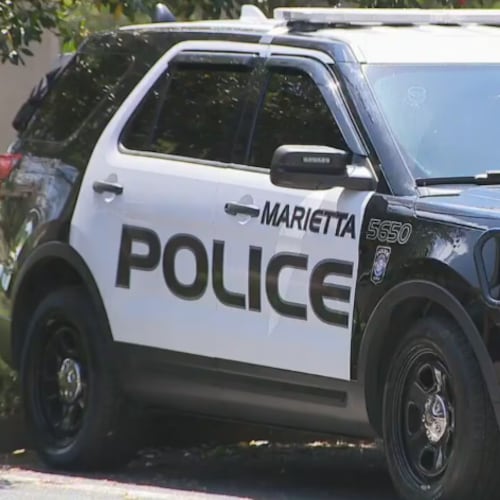Political leaders of varying stripes and religious leaders in robes of many colors took turns paying tribute to a man of peace at Ebenezer Baptist Church Monday on the occasion of the first Martin Luther King Jr. National Holiday.
Warriors from non-violent campaigns of different eras and countries also flocked to the 18th annual ecumenical service honoring the birthday of King, who would have been 57 last Wednesday.
Among those in the capacity crowd that overflowed Ebenezer’s pews was Rosa Parks, whose refusal to give up her bus seat to a white in 1955 gave rise to the Montgomery bus boycott that launched King as a civil rights leader. And in the pulpit was Bishop Desmond Tutu, the Anglican bishop of Johannesburg who is applying King’s non-violent principles to South Africa’s civil rights struggle.
The connection between King and Tutu, who received the Martin Luther King Jr. Peace Prize during the three-hour service, was noted by many speakers during the emotional ceremony.
“The rare genius of Dr. King enabled America to confront in peace the evil of apartheid in our own country,” said Sen. Edward Kennedy (D- Mass.). “And how much we miss him today in our continuing effort to advance his cause in our own land and in the urgent struggle to end the evil of apartheid in South Africa.”
Kennedy called Tutu, the 1984 Nobel Peace Prize winner, “the Martin Luther King of South Africa.”
In awarding the King Peace Prize to Tutu, Coretta Scott King, King’s widow and president of the Martin Luther King Jr. Center for Nonviolent Social Change, said, “Like Martin, Bishop Tutu possesses faith that dissipates despair. Like Martin, he repeatedly encourages those who are denied fundamental human, civil and political rights never to doubt that they will one day be free. Like Martin, Bishop Tutu understands that injustice enslaves the oppressor and the oppressed. Like Martin, he works and lives through a belief in the inevitability of liberation and justice.”
Facing the sanctuary where King was introduced to religion as a young boy by his father, the Rev. Martin Luther King Sr., and where an adult King later preached, Tutu began, “It is a very great honor that has been bestowed upon me, and I tremble as I stand in the shadow of so great a person.”
In an acceptance speech alternately whispered in reverence and roared in anger, Tutu said he accepted the award only as a representative of those South African blacks who have been “peace-loving to a fault” while being subjected to injustice and oppression.
“I receive it on behalf of those languishing in jail, sentenced to terms of life imprisonment because they have the audacity to say, ‘All we want for ourselves is what white people want for themselves,’ " he said.
Tutu passionately implored the United States and other free nations to throw their support behind the overthrow of apartheid.
“To side with us is to side with justice, to side with peace, to side with righteousness, to side with reconciliation, to side with compassion, to side with sharing, to side with caring,” he said.
Vice President George Bush, representing President Reagan at the service and a wreath-laying ceremony at King’s crypt, defended the administration’s policies in South Africa.
“Let me make this clear, the president and I have repeatedly stated our abhorrence of apartheid in South Africa,” Bush said. “We’ve repeatedly called for an end to that system, and on behalf of the American people here today in this sacred place, I call again for the end to apartheid.”
The Rev. Joseph Lowery, who as president of the Southern Christian Leadership Conference heads the organization that King led during the movement’s glory days, said the legislation making King’s birthday a national holiday should be seen as a new beginning in the struggle for equality in America.
“We work toward that day when black will not be asked to get back, when brown can stick around, when yellow can be mellow, when a red man can get ahead, man, and where white will behave all right,” Lowery said.
Other American political leaders attending the Ebenezer service were U.S. Housing and Urban Development Secretary Samuel Pierce; Sens. Robert Dole (R-Kan.), Bill Bradley (D-N.J.), Sam Nunn (D-Ga.) and Mack Mattingly (R-Ga.); Rep. Newt Gingrich (R-Ga.); Mayor Andrew Young and Gov. Joe Frank Harris.
Dinesh Singh, a member of the Indian Parliament, represented Indian Prime Min ister Rajiv Gandhi.
Among religious leaders present were Archbishop Iakavos of the Greek Orthodox Archdiocese of North and South America; Cardinal Bernard Law of Boston, repres enting the U.S. Catholic bishops; and Rabbi David Saperstein, director of the Religious Action Center of Reform Judaism.
King’s enduring ability to unite people was apparent as the service concluded with the congregation lifting voices in the singing of the movement’s anthem, “We Shall Overcome.” Holding hands on the pulpit and swaying with the crowd were Bush, Mrs. King and Tutu.
About the Author
Keep Reading
The Latest
Featured


